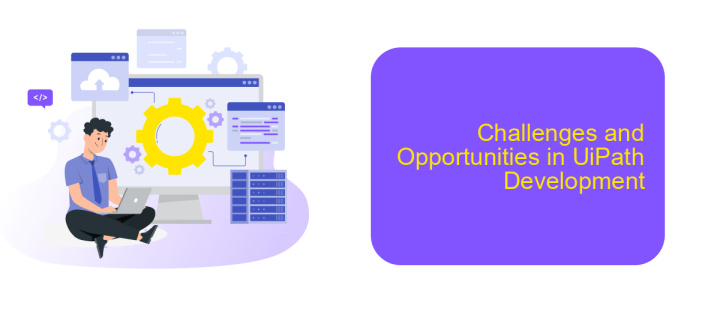What is the Future of RPA Developer UiPath
As the landscape of automation continues to evolve, the role of RPA (Robotic Process Automation) developers, particularly those skilled in UiPath, is becoming increasingly pivotal. This article explores the future prospects for UiPath RPA developers, examining emerging trends, technological advancements, and the growing demand for automation expertise in various industries. Discover what lies ahead for professionals in this dynamic and rapidly expanding field.
The Growing Demand for UiPath Developers
The demand for UiPath developers is on the rise as businesses increasingly adopt Robotic Process Automation (RPA) to streamline operations and reduce costs. Companies are looking for skilled professionals who can design, develop, and manage automated workflows using UiPath's robust platform. This growing need is driven by the desire to improve efficiency and maintain a competitive edge in the market.
- Integration Capabilities: UiPath developers are expected to integrate various tools and systems seamlessly. Services like ApiX-Drive facilitate these integrations, making it easier to connect different applications and automate data flows.
- Scalability: Organizations require scalable automation solutions that can grow with their business needs. UiPath offers a scalable platform, and developers must be adept at building solutions that can handle increasing volumes of tasks.
- Customization: Tailoring automation solutions to meet specific business requirements is crucial. UiPath developers need to customize workflows to address unique challenges and optimize processes.
As the adoption of RPA continues to expand, the role of UiPath developers becomes increasingly vital. Their expertise not only helps in implementing efficient automation solutions but also in maintaining and upgrading these systems to keep pace with technological advancements. Consequently, investing in skilled UiPath developers is a strategic move for any forward-thinking organization.
Key Skills and Technologies for UiPath Developers

UiPath developers must possess a diverse set of skills and be proficient in various technologies to excel in their roles. Key skills include a strong understanding of RPA concepts, proficiency in UiPath Studio, and the ability to design and implement workflows. They should also have experience in programming languages such as VB.NET, C#, or Python, which are essential for creating custom activities and scripts. Knowledge of SQL databases and the ability to perform data manipulation and extraction are also crucial for effective automation solutions.
In addition to technical skills, UiPath developers should be adept at integrating various systems and applications. Familiarity with tools like ApiX-Drive can be beneficial, as it simplifies the process of connecting and automating workflows across different platforms. Strong problem-solving abilities, attention to detail, and effective communication skills are also vital, as developers often collaborate with business analysts and stakeholders to ensure that automation solutions meet organizational needs and compliance standards.
Career Opportunities and Job Outlook

The role of an RPA Developer specializing in UiPath is rapidly evolving, offering numerous career opportunities. As businesses increasingly adopt automation to streamline operations, the demand for skilled RPA developers is on the rise. This trend is expected to continue, making it a promising career path.
- Designing and developing automation workflows using UiPath.
- Integrating various applications and services, such as ApiX-Drive, to enhance automation capabilities.
- Maintaining and troubleshooting existing RPA solutions to ensure optimal performance.
- Collaborating with business analysts and other stakeholders to identify automation opportunities.
- Staying updated with the latest UiPath features and industry best practices.
With the growing importance of digital transformation, the job outlook for UiPath RPA developers is highly favorable. Companies across various industries are investing in automation technologies, leading to a surge in job openings. By mastering UiPath and related integration tools like ApiX-Drive, developers can significantly enhance their employability and advance their careers in this dynamic field.
Challenges and Opportunities in UiPath Development

UiPath development, while promising, comes with its own set of challenges. One of the primary obstacles is the steep learning curve associated with mastering the platform. Developers need to invest significant time and effort to become proficient in UiPath's diverse functionalities and tools. Additionally, ensuring seamless integration with existing systems can be complex and time-consuming.
Despite these challenges, there are numerous opportunities for growth and innovation in UiPath development. The increasing demand for automation solutions across various industries opens up a vast market for skilled RPA developers. Furthermore, advancements in artificial intelligence and machine learning present exciting possibilities for enhancing automation capabilities.
- Learning curve: Requires significant time and effort to master.
- Integration complexity: Ensuring seamless integration with existing systems.
- Market demand: Growing need for automation solutions across industries.
- Technological advancements: AI and machine learning enhancing automation.
Services like ApiX-Drive can significantly ease the integration process by providing pre-built connectors and a user-friendly interface for setting up integrations. Utilizing such tools can help developers overcome some of the challenges associated with UiPath development, making the journey smoother and more efficient.
Long-Term Prospects and Future Trends
The long-term prospects for RPA developers specializing in UiPath appear promising as automation continues to integrate into various industries. With the growing demand for efficient and cost-effective business processes, UiPath developers will play a crucial role in designing and implementing sophisticated automation solutions. Innovations such as artificial intelligence and machine learning are expected to augment RPA capabilities, providing developers with new tools to create more intelligent and adaptive automation workflows.
Future trends indicate an increasing need for seamless integration between RPA platforms and other business applications. Services like ApiX-Drive are set to become invaluable, offering streamlined integration solutions that allow RPA developers to connect UiPath with various third-party applications effortlessly. This capability will enable businesses to automate complex workflows across different systems, enhancing overall productivity and operational efficiency. As a result, RPA developers who can leverage these integration services will be in high demand, making the future of UiPath development both dynamic and rewarding.
FAQ
What is the Future of RPA Developer UiPath?
What skills are essential for an RPA developer using UiPath?
How can RPA developers stay relevant in the future job market?
What industries are most likely to adopt UiPath and RPA technologies?
How can businesses integrate RPA solutions with their existing systems?
Routine tasks take a lot of time from employees? Do they burn out, do not have enough working day for the main duties and important things? Do you understand that the only way out of this situation in modern realities is automation? Try Apix-Drive for free and make sure that the online connector in 5 minutes of setting up integration will remove a significant part of the routine from your life and free up time for you and your employees.

